Jeremy L. Jones's Blog
March 8, 2022
7 Things About The Hive
Cassie Mckinny, daughter of the famous hacker Harlon Mckinny is a believer in the Hive. Before the Hive, the Internet was the Wild West; a lawless digital landscape dominated by trolls, pirates and doxxers. But, the Hive put people in control. It allowed the public to meet out justice to those who those who violate the codes of common decency.
But when Cassie makes an offensive joke online she becomes a fugitive from Hive Justice who declare that Cassie's joke was so dangerous and toxic that the only thing to do is to hunt her down and kill her. With the help of her mother and an underground group of hackers, she must find the truth about the Hive before it's too late.
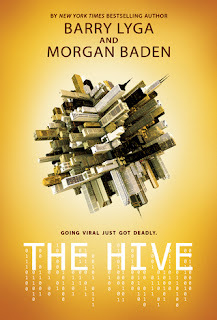
1. Yeah Pretty Much The Logical Endpoint of Social Media:
The story of Justine Sacco of course comes time mind while reading this book (and most likely provided some inspiration if not the template for the book). Justine Sacco, if you don't know or remember, was the woman who made an arguably racist joke on twitter (I'd argue that she was making a wry observation about white privilege but nuance is often lost in situations like this). However you look at it, she made a bad joke and her world exploded.
The Hive does what a lot of good sci-fi does and takes real-world problems and uses technology to drive it to it's logical horrific conclusion. But it does it in a rather clever way. Because if the Hive did exist it would point to situations like this as a reason that there needs to be some system to prevent a woman's life from being totally ruined because of an innocent —if poorly thought out— joke.
2. Anger is Energy
Let's not forget that the mob can be a powerful force. Emperors, dictators and warlords since ancient times knew well that the people needed to be appeased or else they would drag your ass through the streets and throw your body into the Tiber. Conversely, the mob could be a useful tool for getting other factions in the state to fall into line.
3. A diabolical equation
So you've got a public that can be whipped into a frothing madness at the slightest provocation and a leader with the tools to direct that madness at a specific target, what you've managed to do is weaponize social media.
4. Quick note about the modern portrayal of dictators.
After Donald Trump I fear that every American political leader with authoritarian leanings portrayed in a book is going to sound like an assholeish third grader with a head injury.
5. Good concept... okay execution
The book is very much a YA novel and follows that formula pretty faithfully. Which is not inherently a flaw, it's one of the best selling genres out there so obviously a few people enjoy it. But it does prevent this from reaching its full apocalyptic. The story flirts with that idea but collapses inward.
6. Cassie and the abortion joke heard 'round the world
Really a snarky teen with a bad attitude is the perfect protagonist for a world in which one poorly timed remark could spell death. As a former obnoxious teen with a bad attitude and a chip on my shoulder, I'm rather glad that most of my writings from that time period are not immortalized in the digital realm. Which also meant that I deeply identified with her. But, again, the formula sort of limited where she could go.
7. The Verdict ⭐⭐⭐⭐
Again, it's very formulaic. The story hits all the points that it needs to hit, big climax a rather satisfying conclusion, tada! I guess my problem with this is that its a very light read for dealing with this kind of subject matter. I'd still recommend it but, at the end, it's your basic YA novel. Likely a very good book for introducing young people to the complexities and implications of the world that they will inherit, but jaded old farts like myself will probably walk away with a bit of a shoulder shrug.
January 15, 2022
10 Things About Golden Son
In the second installment of the Red Rising series, Darrow has climbed, clawed and cut his way into House Augustus and commands a fleet in a war game to prove the supremacy of his House and patron to the Sovereign.
But when the battle is lost and he is betrayed by House Bellonia, the Gold's rising star loses everything just as The Sons of Ares' rebellion begins to falter.
Now Darrow reaches out to old allies and new in order to launch an audacious plan to create the uprising of the Colors he’s dreamed of since his wife’s death. But as his plan comes to fruition, his secret —that he is a Red masquerading as a Gold to bring down the system from within— is at risk of being exposed.
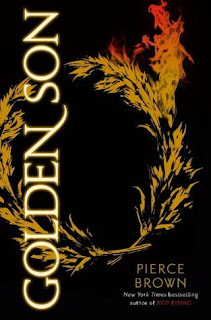
1. Can It Get Bigger?
This question did come to mind after the first book. Because Red Rising is bloody epic. I often described it as Game of Thrones meets Hunger Games. (Or Battle Royal more accurately). And while its pretty obvious that there is more to come, you do get to this point where Darrow is standing astride the smoking ruins of the Academy with even the teachers and administrators dead or fleeing. Darrow makes a definitive statement. So what's next?
Once you reach Golden Son you remember that the Academy was pretty much high school in this world. Real life starts now and it scales up exactly the same way. So if high school leading a rebellion against a false meritocracy and crushing its adherents, the what the hell is the real life gonna be like?
At the same time the story continues to be a strange 'coming of age' tale. Our hero Darrow left his childhood behind in the last book and is moving toward manhood. And manhood, in this instance, involves a trans planetary civil war.
That same quality persists in this book but instead of Society trying to prevent him from wining some schoolyard game, they are doing it to prevent this upstart kid from bringing down their entire society.
4. Darrow: He of Little Faith.
And the other thing I love is that he remains a young man unsure of his place in the world. He embodies this fear I think a lot of people carry, especially when they are young. It is a fear of being called out as a fraud.
I mean he is a fraud strictly speaking. He is of the lowest Red class surgically enhanced to be a Gold, but still the idea is still there.
I, for one, very much identify with the feeling of being in the middle of a big project (a book lets say) and wondering, 'The fuck am I doing?' It goes hand in hand with the strange 'coming of age' aspect of this book and I found myself really enjoying Darrow's introspective moments in between, you know, single-handedly leading a rebellion of the Lowcolors or shooting himself out of a cannon through the hull of a star ship (yeah that's a thing).
At this point Darrow's closest friends and even his lover are all Golds. They are the scions of the most powerful families in Society. They are, not to put too fine a point on it, the first up against the proverbial wall should he succeed. And yet, at every turn he relies on a strange fanatical loyalty he seems to inspire wherever he goes. Part of his internal conflict is the fact that he intends to betray those who have given him everything they have. There is really no other way this can go. And as much as he hates the Golds and Society for taking away his wife and reducing his people to slaves, well, he is one of them.
And in order to fight for house Augustus, serve his patron (and, you know bring this whole filthy society to the ground) he must tap into the simmering rage of the Lowcolors. But that itself it’s also a contradiction. The golds, even those who befit from the current uprising, have no interest in sharing power. And again he is caught playing two sides. One one hand he has to assure his friends and patron that raising up the so-called inferior colors is simply a means to an end. On the other, it is and it doesn't stop with one battle.
The end is as shocking as it is inevitable. Darrow must win the loyalty of his friends in order to ruin them. He must pretend to care nothing for the Lowcolors while pushing them toward revolution. And that conflict ends exactly the way it likely should. I'm not going to say any more except for.. holy shit. If George R.R. Martin ever read it, I'm pretty sure he'd get an erection.
Like this pan-planetary autocratic system, our world is run by a corrupt class that is really only concern with their own station. That is their weakness but also a strength. For it would take a member of their class to essentially betray them and lead the revolution. And, as this book illustrates in grisly fashion, that doesn’t work out all the time.
9. The Verdict: ⭐️⭐️⭐️⭐️⭐️A brilliant continuation of the story. One definitely needs to read Red Rising first but it even if that book weren’t excellent, it would be worth getting through for this one. It's action-packed and heartbreaking and profound and, well, just a hell of a ride. Somebody is going to pick this up and make a series out of this someday, mark my words. Check it out and enjoy being the smug son of a bitch who 'read the book first'.
January 3, 2022
Declan Reviews Jeremy's Best Books of 2021
Hey folks. Well, it’s been another year hasn’t it? It probably feels like it's been a quiet year around these parts because... well... it has. Mostly because of this adorable little guy who is just about 16 months old now and who has filled my last year with love, sleepless nights, shit, drool, pee, other unknown bodily fluids, joy, frustration and a myriad of other emotions both good and harrowing.
 Ain't he cute though?
Ain't he cute though?Suffice to say that this small vortex of sentient destruction has cut into my writing and reading time. So much so that I am sad to say that I won't be able to to my top twenty books this year. Mostly because I didn't even finish twenty books. But I did read a few so I've got a top five list and I can’t think of a more appropriate reviewer than my son, Declan Jones. Take it away, Kiddo.
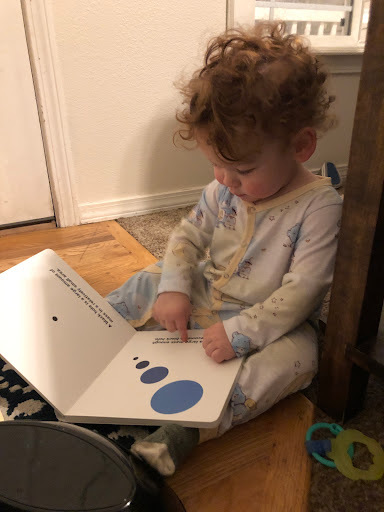
Yes, well, thank you, father, for that kind introduction. And while we are discussing the last year let me just say that being raised by a neurotic wanna-be author is no treat either. At this point I’m not sure if my name is Declan or Please Stop Crying So I Can Freaking Write God Damn It. I do so hope it's the former as the latter should make my early school years positively unbearable.
Anyway, where were we? Ah yes. Books. I have developed a fondness for them in my short time on this planet. Not to read per se, but I find them quite tasty and tear-able. Two qualities I appreciate in any object. Books have an added bonus as well. After the satisfying ripping sound there is the scream of anguish as my father realizes what I have done. Ah… I shall destroy that man.
And with that in mind, Father's top five books of 2021.#5: Operation Outfect
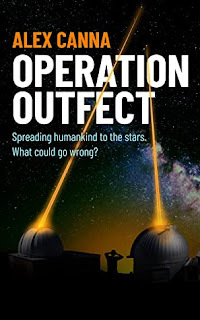 I have only met around twenty humans in my entire life and even that is enough for me to understand that spreading this species across the galaxy… *shivver* It makes me want to load my Huggies. The story follows a team trying to scam a group of billionaires to let them be the first to colonize space. The whole idea of the book felt like something I should have enjoyed more. It’s just that. Well…
I have only met around twenty humans in my entire life and even that is enough for me to understand that spreading this species across the galaxy… *shivver* It makes me want to load my Huggies. The story follows a team trying to scam a group of billionaires to let them be the first to colonize space. The whole idea of the book felt like something I should have enjoyed more. It’s just that. Well…See I am quite fond of Cheetos. Those delicious puffy snacks may, in fact, be the epitome of human cuisine. At any time of the day, I will take a Cheeto. Please and thank you.
But every once in a while my father tries to slip me one of those Gerber cheese-flavored puffs. Now, they look a bit like a Cheeto. They even taste like a Cheeto assuming you enjoy a Cheeto made entirely of sawdust.
On the surface this book appears to be a Cheeto with its mix of social commentary, questions about humankind’s place in the Universe and the promise and threat of technology. And there is quite a lot going for this story, interesting characters, engaging story, clever twists and turns. What I am saying is the book tastes good, but it is no Cheeto, Sir.
Four stars would throw on the floor do I can eat it later.
My review on Operation Outfect
 Not A Cheeto!
Not A Cheeto!The Art Of War
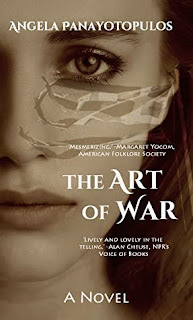 Yes thanks to Fathers propensity for Documentaries (yes, folks I can confirm. It’s not an act. He really is as boring as he seems) I have some knowledge of WWII. At least I understand that Nazis are bad which is, apparently, more than I can say for about 30% of this country.
Yes thanks to Fathers propensity for Documentaries (yes, folks I can confirm. It’s not an act. He really is as boring as he seems) I have some knowledge of WWII. At least I understand that Nazis are bad which is, apparently, more than I can say for about 30% of this country. This book is set during that terrible war in a place called Greece. From the description it seems like a nice place. At least until the Nazis come. Then it’s even worse that COVID-times America. A lovely tragic tale that made me cry and not just because I’d dropped a deuce in my diaper. Although that was sometimes a factor. There is a theme of art and destruction that is both beautiful and tragic. It has inspired me to create my own art project. I'm thinking something along the lines of crayons all over the living room wall. I am sure the parental humans would love it.
Five stars. Would put in my mouth again. My Review on Art of War. Also yeah... so can't wait for that.
American Gods
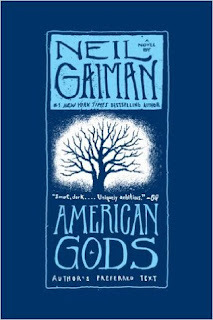 I like Neil Gaiman. He treats the world of mythology much as I treat every drawer in my house. As a thing to tip out and rearrange to my liking.
I like Neil Gaiman. He treats the world of mythology much as I treat every drawer in my house. As a thing to tip out and rearrange to my liking. In many ways this country and myself are startlingly similar we both toddle across the floor from one self created disaster to the next while oscillating wildly between shrieking rage and sociopathic joy. Now I do this because I am about a year and a half old. I cannot even fathom the giant collective head injury that would cause an entire country to behave this way. But, perhaps, the answer lies in the pages of this novel where Gaiman unfolds a tale about the strange and often conflicting set of beliefs that come together to form the national zeitgeist.
Fun entertaining and increasingly relevant or so I am told. Five stars would tip upside down and splash in it until it inexplicably hit the ceiling.
My Review of American Gods
Ten Sigma
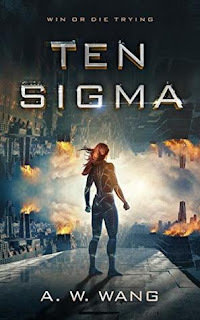 There are a lot of stories about people who have lost everything being press-ganged into sadistic games for the benefit/amusement of a small ruling class. I am starting to believe that this may not have been the most opportune time to have been born.
There are a lot of stories about people who have lost everything being press-ganged into sadistic games for the benefit/amusement of a small ruling class. I am starting to believe that this may not have been the most opportune time to have been born. Which means that every drop of drool, piss, shit, or any other fluid I spray across this world is a small act of political rebellion.
But I digress.
Ten sigma is an engaging story about how the plutocracy forces us to shed our shared humanity and destroy each other. Preferably with a rock. Both a thrilling narrative, although gory at times, but with deeper ideas about a world we created that benefits literally nobody.
The constant violence and misery does become strangely tedious at times but if life has taught me anything it’s the value of tenacity. Sometimes in order to get to a place where I can put a toilet brush in my mouth I have to keep trying until one of the parental humans either gives up or lets their guard down.
Five stars. Worth pulling down off the coffee table ripping apart and spreading its message all over the world. My Review of Ten Sigma
Red Rising
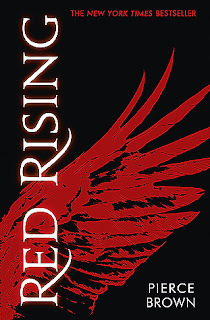
Ah yes and speaking of terrifying views of the future…
I must say I connected with this book in a very personal way. I too know what it is like to be treated as a lesser person. Quite often I will find something interesting in a cupboard. Sometimes it’s shiny and sharp. Just when I consider inserting it into my eye one of these blasted parentals takes it away, puts it somewhere higher up and deliberately exploit my lack of object permanence to pretend it doesn’t exist. And it works because, you know, no object permanence. Still I know there is something fun just out of reach. I can practically feel it dribbling down my chin.
What I am saying is that I know exactly how the Reds feel in this book. But besides a tale of oppression and fear it is also about hope. For despite the injustices in this world all of us have the power to change it. In the book Darrow finds, at every turn, the rules bent against him. But that only works if one plays by the rules. It teaches us that, sometimes, Five stars and a with an extra bit of slobber.My review of Red Rising
Well that was fun. Now if you all will excuse me. My father has just sat down with a book so I feel that it is time to find something heavy and breakable to pull off a high shelf.
 Declan uses a pint glass in the most wrong way
Declan uses a pint glass in the most wrong waySeptember 26, 2021
7 Things About Dymon's Lair
Beyond the farthest reaches of space, the crew of Fallon's Angel find themselves broken down and out of fuel. In order to get back home they must reach out to a primitive planet, Earth, and seek out. But the planet is run by Dymon Wesker, the richest and, consequently, most ruthless person in the world.
As he moves his resources to help the aliens and farther his own nefarious scheme, the crew must make a choice. Leave the planet in the control of a cruel madman or run afoul of Universal Law and save the people of Earth.
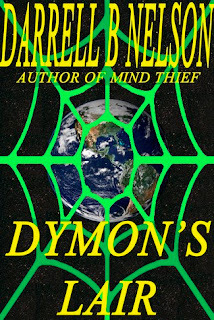
1. Let's Talk Villains:
A good villain can carry a story by themselves. If you don't believe me, check out my son's dresser. He has a lot of Star Wars clothing because my friends are fucking geeks. (Not sure how that happened but so be it.) And of them a decent percentage —let's say half— feature Darth Vader. Yoda is probably number two None of them feature Luke Skywalker. Because fuck that whiny bitch.
Which brings me to Dymon Wesker. He's a good villain in the sense that I'm not going to forget him anytime soon. The problem is that he has exactly zero redeeming characteristics. He's a cruel, selfish, greedy son-of-a-bitch who's every utterance sounds like is was written by Ayn Rand and rapes people for sport.
2. The Darkness Inside:To me a good villain is one complex enough that people can, on some level, relate to them. They do horrible things but they make sense. Maybe you got to warp your brain a little bit in order to fully understand their actions but the path is there. In our darkest times we might even see ourselves going down that path wherever it might lead.
The problem is anyone who can relate to Dymon should probably seek out professional help. The man is just Evil with a capital E. Cartoonishly so. He's basically one of those Persian-cat-stroking, cackling-in-his-secret-lair, mustache-twirling bad guys from Saturday morning. Which are fun, don't get me wrong, but there's not a lot of complexity there.
Which is indicative of an over-all problem I had with this book. All the characters feel flat. Dymon with his sheer audacity looms large but, in the end, he is less a character and more of a caricature. And the rest are so forgettable that... well I've pretty much forgotten about them already.
I noticed some attempt to round out some of the crew members with some side-story arcs and even a ham-fisted love tale but it just didn't work.
4. Let's Talk Mood:Mood is a fickle thing in a book. When it works one doesn't notice. The wine is poured, the candles are lit, Barry White is crooning on the stereo, there's flower pedals all around, and it just feels right. It's only when the goat charges in and machine-guns ass pellets across the bedspread that one notices something is wrong. The mood is broken.
I mostly liked this book. It was a fun, light-hearted escapist fantasy with some witty moments and some appropriately deadpan humor. But scattered aroun were a few things that became that incontinent goat.
5. Goat Moments:I get that Dymon is supposed to be a completely unredeemable human. But making him some kind of gleeful serial rapist is way over the top. And it's pervasive all throughout the book. It's how he keeps his people in check. Which... yeah that would work, but in a story that has a light-hearted, fun feel to it, it's feels out of place.
And then there's the journalist scene. On it's own its a great scene. A journalist runs afoul of Dymon and is graphically and quite creatively tortured. And in a book with a darker, more horrific feel it would be perfect. In this book, it stands out. And not in a good way.
6. A straight shot to Hell on EarthAs a whole, the story is good though. It was very linear and reminded me of a lot of short stories and books in the scifi genre where aliens arrive at Earth and are mystified by the bizarre way these humans organize themselves and set about trying to fix it for these silly over-evolved apes. And like the titular villain the world this all takes place in is a caricature of reality. It's a late-stage capitalist dystopia in which the meritocracy has run it's course and now its time to the last man standing to feast on the flesh of the entire population.
7. The Verdict ⭐⭐⭐It's a fun book. Especially for those that need an escapist fantasy where aliens arrive to fix this broken down world. I can definately see where that would be appealing to some. The aformentioned problems do get in the way but, if one can overlook that, it's a fun journey through a predictable
August 29, 2021
8 Things About Operation Outfect
The worlds richest and most powerful people have decended on a remote compound in South Africa to meet with Max Londt, an eccentric billionare who has developed a way for humankind to colonize the stars.
Neil Grenham, a disgraced PR expert with a reputation for helping the worst people in in the world to terrible things, is recurited to help convince this elite group to sign up as passengers. He also needs a way to convince the extra-terrestrial beings on the other side to take them. In the process, he delves into his own past with the South African military during apartheid and realizes that something far darker might be involved in this plan for the rich to escape Earth.
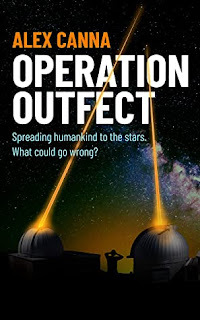
1. The World As It Could Be:
A world in crisis, humanity choking to death on its own shit and a billionaire class with more money than brains looking to get out and pull the ladder up behind them. Yep it pretty much seems like our world.
This story does have a couple of brilliant elements that move the plot into the sci-fi relm. Most obviously the method by which Max is promising the richest people in the world a trip to the nearest stars at light speed with no risk.
How you might ask? Well you'll just have to read the book!
My rule of thumb is that if it happens before the 50% point in the book, it's not real spoiler. But I'm also sensitive to the fact that this might be the kind of thing people want to discover for themselves. If that is you, stop reading this and go get the book. It's pretty good, I'd recommend it. Go get it. From here out fucking spoiler.
Fucking Spoiler!
Here's what happens. Max transcribes DNA into a series of numbers, takes that and breaks it down into a relatively simple equation and uses lasers to beam that into space along with instructions potential aliens could use that information to make human clones.
4. But Isn't That Stupid?:On the surface it's a bit of a cop-out. Or, at least, if I were one of the rich people in Max's presentation, I'd feel cheated. After all, nobody is really traveling anywhere. The people who sign up never actually leave Earth and any potential beings that arise from this effort do not share the experience with the donor of said DNA anymore than any other parent-child relationship.
So on one hand it feels a little unsatisfactory.
But when you think about it...
5. No, it's actually bloody brilliant:I mean come on, what billionaire with an over-inflated sense of self-worth (which is to say all of them) wouldn't get positively giddy at the prospect of sending their DNA to the stars like so much genetic graffiti. Especially at a price that is essentially pocket change to them but enough to keep 99.9% of humanity out.
Basically they are paying to fuck the entire Universe. Literally. With like genes being swapped and all of that. Yeah you could get buy-in from the billionaire class from this. All day long.
6. But why would the aliens want a bunch of dumbass humans running around?That's the big question of the book and the mystery that our intrepid hero sets out to solve. And the method he uses is clever. Very clever. And it's just stupid enough to work. But somehow the execution feels lacking. For a start it per-presumes that extra-terrestrial life would have wants and motivations similar to humans. And second solving this mystery becomes secondary to a sub plot of the book to the point that the solution feels tacked on at the end.
7. Lost In South Africa:The novel takes place in a place I know relatively little about but the story really helps bring this place and culture alive. Not only that but there is a sense of lived history in these pages as the author has to come to grips with being a part of an oppressive and racist system.
And as cool as that is, it starts to get in the way toward the end. To the point where I felt like I was reading a different novel than the one I started. And I can certainly imagine the parallels between a project to send the rich into space and a brutal class system like apartheid, but the story doesn't really bring them together in any satisfying way. The reader is just left to ponder what might be.
8. The Veridict ⭐⭐⭐⭐The book started off strong. Interesting characters, a fun concept, big questions, all the stuff I love about sci fi. Early on I was hooked. But at some point, somewhere around the 65% mark, the story loses its way. I seem to remember some cartoon where a big powerful locomotive leaves the station and, when it arrives at it's destination, it's basically scrap metal held together with bailing wire and duct tape. Or maybe that's just a half-remembered story I cooked up in my own head. Anyhoo the book feels a bit like that train. Starts strong and ends... okay?
I liked the book but feel there were some big questions and some really good social commentary but that also gets lost at some point. Still worth picking up as others might see what I might be totally missing.
August 5, 2021
7 Things About Art of War
The Greek island of Mythaki is a place like no other in the world. Twins Gabe and Kali spend their childhood in this Eden surrounded by family, community and culture. Gabe grows up learning the skills of a fisherman in the Mediterranean sea while Kali discovers a love of painting in the iconography in the villiage church.
But this innocent time comes to an end as World War II spreads fear, death and chaos across Europe. For Gabe and Kali, their once ideal world becomes an apocolyptic hell from which there is no escape.
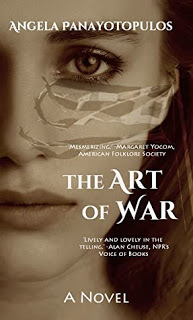
This story is a beautiful depiction of a time in history that I'm fairly familiar with and a place that I am very much not. The story takes place on the Greek island of Mythaki in the early 1940's. And even back then it feels like a place frozen in time. The people spend their days fishing in the sea or herding goats on the hills. They farm grain and olives. A radio in the cafe appears to be the only source of information from the outside world.
And, of course, it works so well that this early time is told through the eyes of children who later grow into young adults just as all Hell begins to break loose.
The old Irish ballad, 'The Town I Loved So Well' kept running through my head while I read this. It was the same feeling. That love for a time and place that is ravaged by the evils of the world.
3. Even Eden Has Scars:I thought a particularly interesting character was the old man Haris from early in the book. Besides acting as a kind of boogie man for the children, he is this strange outcast from this society. It's clear he is suffering from the effects of World War I and it It was a particularly effective element to show that this place is not as sheltered as it might seem. By contrast I think it also shows the strange naivete that is indicative of this inter-war period. This sense that, given how bad the Great War was, we would never do something so destructive again.
4. Yeah That's The Italians:Another detail that I liked was the disposition of the Italian soldiers that first invaded the island. Well, invaded is not really the right word. They were more like house guests that show up unannounced and overstay their welcome. They are dangerous but not like the pure evil malevolence of the Nazis later the in the book. They are only dangerous because they are so inept their gun might go off at the wrong time. Of course they are as likely to shoot themselves in the foot.
Which is pretty accurate from what I understand about the Italian effort in the Second World War.
5. Love At The End of The World:One would think that such frivolous things like romance and love would kinda be put on hold while the world is burning. Or maybe I just think that. But I like how it's handled here. In strange ways its almost as messy, bloody and destructive as the war that rages around them.
The one thing that I didn't like about this book was that, every so often, the language gets a little too flowery for my taste. I get the desire to emphasize some of the really dramatic details and feelings in this story but I think this is already extremely well done in the characters and description. When it comes to the language in situations like this, less is more.
7. The Verdict: 🌟🌟🌟🌟🌟It really is a lovely, intense, heartbreaking story. The background cultures are rich, the characters are vivid and engaging, the level of detail is vivid without slowing down the pace of the story. Overall just a beautiful peace about family, love and community in a time of almost apocolyptic horror.
July 17, 2021
6 Things About Advanced Screenings
Life on Earth is changed forever when a television signal from the planet Loamar. Overnight the people of Earth realize they are not alone in the Universe and there are others who communicate via stories. But when a tragic event befalls the Lomani people, humankind's place in the Universe changes forever.
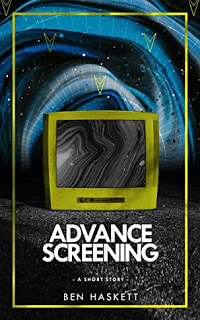
1. My continuing love of short books:
Not to belabor the point but getting a lot of reading done with an infant in the house is... difficult. So books that can be tackled in three or four hours are increasingly valuable to me. And this book —more of a short story than a book to be honest— can be read over a couple of hours in the evening.
2. The Truth Is Out There. Probably Aliens Too:The story is another speculative foray into the Big Question of the Universe. If there is intelligent life, what's it like? Haskett proposes and interesting idea. He envisions alien species rising to the civilizational level based on a few very strong traits. In essence why and how a species develps is largely based on a couple of key strengths inherent in teir biology. The Loamani, while having yet to master any form of air travel, have none the less built a telecommunications system that spans the stars. Another mentioned civilization is especially good at faster-than-light travel.
3. Oh cool, so what are humans good at?Um... listen, I don't want to spoil it for you it's a short book so I don't wanna give too much away. Plus you can probably guess.
4. It's Killing Each Other, Isn't It. That's What We're Good At.What can I say? The author knows his species.
5. Less Xenobiology and more Xen-adorable.My hard-sci fi heart couldn't help but jump at the chance at pointing out that almost nothing about the Lomani or any other species really jives at all with any theories as to how life and civilization might have evolved. But that would be wildly missing the point
Earth needs hope. And hope comes in the form of cute, furry creatures (for some reason I pictured Ewoks but taller and skinnier) that are born in dirt with a flower on their head. There is a charming playfulness that comes out when the Loamani television programs are described. Just the kind of thing that, yeah, could bring a planet together in one collective 'Awwww!'
6. The Verdict ⭐⭐⭐⭐⭐It's a cute fun story. Maybe a little too much on the cute side for my taste but with an engrossing enough story to make that forgivable. Unless that's your thing in which case, all the better. The ideas it presents are interesting and, like I mentioned, there's an element of hope that our darker instincts might not be as self-destructive as we might assume. And who couldn't use a quick dose of hope right now?
June 16, 2021
9 Things About American Gods
You: Jeremy, are you telling us that you haven't read American Gods until now?
Me: Yes.... shut up.
You: Seriously???
Me: Oh like you don't have a book out there that seems like something you should have read but haven't because, oh I dunno, life?!"
...
ANYHOO!!!
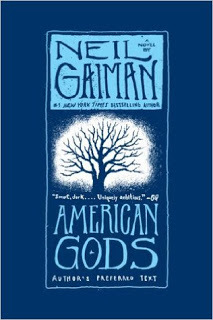
Shadow, locked up for assault and his part of in a failed robbery finally leaves jail and meets the enigmatic Mr. Wednesday. Together they set out on a journey to discover the soul of America and unite the old gods left behind by the waves of people that settled America over the years.
But America is no land for gods. And even the new gods that have taken root have to fight for the small amount of belief they still have. As a storm brews, Shadow discovers the true nature of his homeland and his past.
1. America is the Only Country That Searches For Itself:
I'm not sure if that was the quote exactly but I think that was a quote from the book. Or the book made me think of that quote. I can't remember and I don't want to look it up. (Thus proving my American-essness) My point is wherever that idea came from, that's what the soul of American Gods is. Gaimen reflects on the this country in only the way and outsider —Neil Gaiman is an English-born ex-pat— could. And I imagine the journey his characters embark on is not unlike his own through this great land.
2. America is no land for gods.This is a central theme and the main conflict. Shadow acts as Mr. Wednesday's driver and bodyguard and the two set out to recruit gods, the physical manifestations of the beliefs and traditions of the hundreds of cultures that people brought through the centuries to this new land. These gods were brought to America by their people and abandoned with little belief to sustain them. A battle begins brewing between these old gods and the new ones. Gods like Media, Technology, Men In Black and many others, you know, modern American Gods.
The point is even the new gods feel belief in them slipping as the collective American mind moves to the next bright and shiny new thing leaving even those that are relatively successful scrambling to keep what's theirs.
...Which, come to think on it, one could probably sum up the divisions in this country pretty well with that idea. Those that feel that the country has moved on and left them behind getting angry at those that benefit from the new status quo. Meanwhile those momentarily on top desperately trying to pull up the ladder behind them while howling at those trying to revert the country to some imagined golden age.
And in the middle a mysterious puppet-master who just thrives on chaos...
4. You Need To Find You Some JesusIt's understandable, given the way religion is regarded in this country, that Gaiman would want to steer clear of any reference to God or gods that people currently worship. After all, this book is less about religion specifically and more about the faith, belief and reverence that is part of the American Experience in all it's forms. Not just piousness in church but also the worship of the broadcasted images and the venerated purchase at Walmart.
And yet, Christianity is so intertwined with American culture to not have the American Jesus make an appearance seems like a pretty stark omission.
5. ... And it fact it was:My copy was the 10th anniversary edition with little bells and whistles stuck in including a few 'deleted scenes'. One of which was a brief moment where Shadow runs into a pack of Jesi (one Jesus, two Jesi... get it?) who changes form even has He explains his place in the American psyche. Gaiman says it just didn't feel like it belonged in the book. I feel like something was missing from the story without it. He's likely much smarter than me so I'll default to his wisdom to have not included it but I'm glad it was printed somewhere. It gives a window the the expanded Universe that must have been part of the creative process for this book.
6. That's Why They Call It The 'American Dream'. You Gotta Be Asleep:Gaiman captured something else in the tail of the the old gods vs new gods. That screaming desperation of a people who were sold a bill of goods and then left hanging. As Shadow and Mr. Wednesday make their way through back roads from little town to little town, sub plots start to emerge. Young people trying to get out before its too late, older folk clinging to what's left and towns drying up and blowing away. Outside pockets of prosperity people are hurting and the pain is revealed here.
...Which, you know, is part of the American Experience as well and always has been. As the book eludes to, there were people here before White people arrived with their own gods and values. They too got swept away for bigger, brighter and shinier things. At some point it's less a bug in our nation's operating system and more like a feature.
Obviously an amazing book. And growing more relevant as time goes on. So much so that, apart from the already antiquated references to technology, it's hard to believe that it was written twenty years ago. But then again, while some things have changed, others have not.
Plus all the weird, wild, fanciful imagery that Gaiman brings to all his work. Yes, check it out. But, as someone who started the mini-series and then stopped to read the book first... read the book first. The mini series is good but they had to expand the world considerably to stretch it out to... three seasons now? The book is nice and self contained and I feel is better enjoyed then expanded on.
9. One Final Thing About Mead:Early in the book Shadow has to drink mead, fermented honey wine, to seal a pact with Mr. Wednesday and the description is... not pleasant. And I just want to say this, Mr. Gaiman, if you've not had good mead, give me a call! I make some pretty nice vinatages myself. I also know people. Do not whatever hell-brew someone tried to pass off to you as mead form the entire basis for your experience. It can be amazing.
So just know, that, if there ever comes a day that I have the opportunity to meet you Mr. Gaiman, I'm bringing mead. Make peace with this now.
I eagerly await your restraining order.
June 10, 2021
6 Things About The Stray
Ethan has always been a reluctant adopter of technology so it was a big step when he allowed his first implants wired to his brain. Even more so when he agrees to a strange experiment. He will live in a house, sleep, and dream. The next morning he wakes up to confront the people that he saw in his dreams, many of them long passed.
But reality blurs when the ‘reproductions’ know more about their past lives than they should. And the distinctions between what is human and what is computer-generated challenge Ethan's view of himself and what it means to be human.
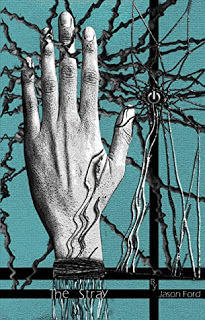 1. A story of philosophy:
1. A story of philosophy: Far from a gripping edge of your seat narrative, The Stray is a book of quiet contemplation. Not only does it delve into the usual sci-fi themes regarding uncontrolled AI and the blending of machine and human consciousness, but it also speaks about the nature of life and being, the illusion of Self, and high-minded brain hurty questions like that.
A major theme discusses human's need to define themselves via their past. A trait the story uses as the proverbial dividing line between human and animal. And not always in the positive. It's a dog's ability to simply live from one moment to the next that, on some level, makes its existence better than the silly humans who frame every single moment through their past.
What makes this book unique is that it constantly asks a chilling question. If a person has the same body and memories as another, are they ostensively the same person? Even if, as in this example, if an AI creates one? What is existence and consciousness anyway?
The book never really provides much in the way of answers or a governing philosophy to these big questions, but it does posit them in a way that's rather scary when AI is added to the mix.
The story is fun too. A bit of a deepening mystery where even those who are ostensibly in charge have clearly lost the tune, and all the characters barrel toward an ending known only by an all-powerful virtual consciousness.
I dug it. It is a compelling story, deep questions, and all contained in a short, concise read. It is a good selection for those looking to power through a book in a night or two or, for people like me who now spend most of their free time taking care of a tiny human, a book one can absorb over a week in ten to thirty minutes bursts.
April 15, 2021
7 Things About Spice Zombies
A deadly plague sweeps the Earth killing billions and turning them into the living dead. The only survivors are zoned out zombies themselves; a pack of degenerates hooked on a drug named spice.
But when they find out that the drug that numbs their senses and makes their miserable lives barely tolorable actually kept them alive, they realize it's up to them to save a world that long since cast them aside.
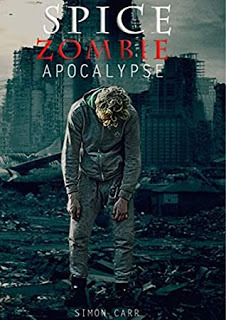
1. Good Pitch:
Found this book on Facebook pitched as Shaun of the Dead meets Trainspotting. Right? How do you not at least crack that open?
3. Execution... could be better:
As the book goes on, however it feels like the characters lose their way. They are swept along by the plot, which, ya know, makes sense to a point. But character development and feels rushed to get to a satisfying end point where they all learned a valuable lesson from their years chasing a fix on the streets and begin new satisfying lives in a post-apocolyptic world. I feel like somewhere in the middle
One of the things that really pulled me out was the shot by shot description of zombie movie action. It's something that obviously works on a visual medium. You got the main characters running, jumping, climbing trees all while the zombie hordes chase them. But written down, it feels extremely tedious.It’s something I’ve discovered in reviews on my own work. Thrilling heroics plays well on the screen but translation to the page is a harder thing to do well.
One of the things that I thought worked very well was the drug and its effects on the character. I wished that would have been played up more as well as some real themes about addiction and society’s treatment of those affected. It's there. It's hinted at a little bit before the characters go all 'monged 13' escaping the zombie horde.As it is the drug seems to effect them pretty heavily early but, after that, its just there. No real effects or side effects. Just a handy plot devise for explaining how this group of miscreants is still alive and kicking.
7. The verdict ⭐⭐⭐:
It was okay. A fun zombie adventure if that’s your thing. Some dry British humor to help it along. It could have been more but it’s still amusing. If you like zombie adventures, sure, give it a go. It mostly likely contains everything you're looking for... namely the Living Dead chasing some inept yet strangely loveable characters around. And spandex. And mohawks.
Although fair warning you'll have to contend with a decent amount of spelling errors, formating wierdness and other polish items. These things rarely if ever put me off but I know they will locate the brainstem of some readers and hammer away like a lunatic.
But if you've pretty much had your fill of the genre, this ain't gonna bring you back into it.



